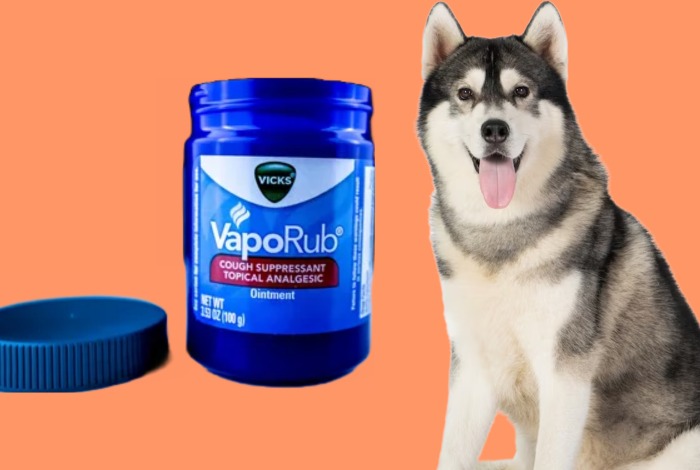Vicks VapoRub is a well-known decongestant and painkiller. Lunsford Richardson, who saw how well it could be used to cure almost any ailment, such as colds and chest aches, launched its first marketing campaign in the early 1900s.
Sadly, he passed away before his invention became well-known, but since then, it has become a necessary item in many homes all over the world.
Can you put Vicks VapoRub on a dog?
There’s good news if you’ve been wondering “can you put Vicks VapoRub on dogs” online and are unclear of what to do: the answer is no.
Even if you’re not clear why the answer is no, it ought to persuade you that Vicks Vaporub should never be used around a dog.
Vicks is exclusively intended for human usage, therefore it’s best to avoid risking it even if your dog isn’t currently a hazard but could become one in the future (similar to an elderly person).
Camphor oil, the major component of Vicks Vaporub, may result in seizures in dogs (and possibly humans) if consumed.
What does Vicks VapoRub do?
The topical ointment Vicks VapoRub is used to treat colds and coughs. It works by easing chest and throat congestion, which can make breathing easier.
Vicks may be able to assist you get rid of extra mucus or phlegm buildup in your body. Vicks is useful for clearing out congestion as well as soothing sore throats brought on by coughing.
Is Vicks VapoRub dangerous on a dog?
Popular over-the-counter treatment for colds and other respiratory conditions is Vicks VapoRub.
However, it is unsafe for dogs to consume, and if they do, they could experience fatal side effects such liver damage and kidney failure.
We advise you to consult your vet as soon as possible if your dog has developed a taste for this sticky ointment and you don’t want them to continue eating.
What happens when you inhale Vicks VapoRub?
It’s safe to use Vicks Vapor Rub. It is not toxic. Inhaled by dogs, it does not kill, hurt, or injure them.Your dog is not at risk from Vicks VapoRub, and ingesting some of the fumes from you won’t hurt him.
Other Medicine that Can Harm Your Dogs
- Aspirin: Your pet could die from taking even baby aspirin. Although some veterinarians may administer buffered aspirin in low dosages, an aspirin overdose can cause aspirin poisoning, which can cause seizures, liver damage, bleeding issues, gastrointestinal irritation, or ulcers.
- Petco Bismol: Has bismuth salicylate, a substance found in aspirin. Even though your veterinarian might prescribe it in the right amounts, an overdose could have results similar to aspirin poisoning.
- Kaopectate: Salicylates are present in new versions of this medication and they may have consequences similar to aspirin poisoning.
- Ibuprofen: Although it works well for headaches, even small amounts of it might be harmful to your pet. Ibuprofen may seriously harm the kidneys or the gastrointestinal system, depending on the dose.
- Pseudoephedrine: If your pet consumes this stimulant intended to relieve your congestion, it may cause seizures in him and raise his body temperature, blood pressure, and heart rate.
Frequently Asked Questions
Q: Is it safe for dogs to inhale Vicks?
A: It is generally not recommended for dogs to directly inhale Vicks or any other topical ointments meant for human use. The strong menthol odor can be overwhelming for dogs and may irritate their sensitive respiratory system. It is best to consult with a veterinarian for appropriate remedies or treatments if your dog is experiencing respiratory issues.
Q: What happens if a dog licks Vicks?
A: If a dog licks Vicks, it can cause gastrointestinal upset and potential toxicity. Vicks contains ingredients that are not safe for dogs to ingest, such as camphor and eucalyptus oil. It is important to keep Vicks and similar products out of your dog’s reach to prevent accidental ingestion.
Q: Will a Vicks humidifier hurt my dog?
A: Using a Vicks humidifier in the presence of a dog is generally considered safe as long as the dog is not in direct contact with the device or the Vicks pads. However, it is important to monitor your dog’s behavior and ensure that they are not showing any signs of discomfort or respiratory distress. If you notice any unusual symptoms or if your dog’s condition worsens, it is recommended to consult with a veterinarian.

